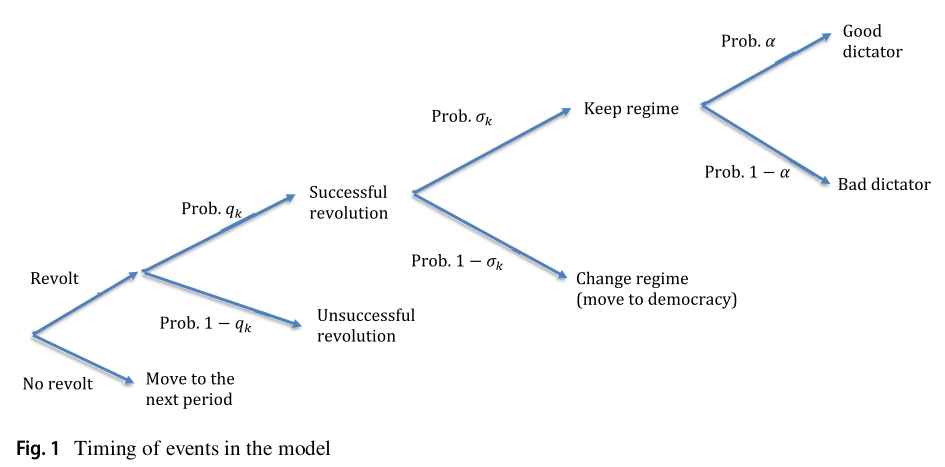- 1 What?
- 2 Why?
- 3 How?
- 3.1 Model:ATTACH:
- 3.2 Data & empirical methods
- 4 And?
- 5 Bibliography
1 What?
This paper questioned whether cultures (individualistic or collectivistic) affect the revolution and transition process to democracy.
2 Why?
This paper extends a large literature on determinant of democracy, whose seminal work is attributed to Lipset (1959). This literature is linked to the role of institutions in economics growth.
The spectrum of individualism/collectivistism is analogous to the degree of paternalism. János Kornai highlighted paternalism as one of the sources of soft budget constrants. The theory partly explained why Confucious countries (China, Vietnam, Singapore, or Thailand) never became democracies, but countries like Russia, Turkey, Hungary, and Poland did. This paper narrow patternalism to the individualistic-collectivist dimension, and build a formal model around it.
3 How?
3.1 Model
They proposed the model for average income \[ y = \delta y^{R} + (1 - \delta) y^{P} \] where \(y^{R} = \frac{\theta y}{\delta}\), and \(y^{P} = \frac{(1 - \theta)y}{\delta}\) are the rich’s income and the poor’s income. The value of \(\theta \geq \frac{1}{2}\) indicate income inequality.
The initial regime is autocratic, and may revolt into democratic. Democracies don’t revert back to autocracies.
- Good and bad autocracy: They assume a good autocrat is one that does not tax or redistribute. Good autocrats are randomly distributed with probability of \(\alpha\).
- The probability of successful overthow is \(q_{I}\) and \(q_{C}\) for individualist and collectivist culture, respectly. It should be the case that \(q_{I} > q_{C}\).
- Once overthrown, the probability that regime stays autocratic is \(\sigma_{I}\) and \(\sigma_{C}\). \(\sigma_{C} > \sigma_{I}\).

The dynamics is as follow: The poor decided whether to revolt based on their value functions. This function is different for democratic regimes, good autocratic regimes and bad autocratic regimes. The focus is whether they would revolt in a good or bad autocracy.
3.2 Data & empirical methods
- Time range: 1980-2010
- Individualism-collectivism: Hofstede measure (Hofstede 2001). Some other variables from the same dataset: power distance, uncertainty avoidance, masculinity, long-term orientation,…
- ivs (because of possible two-way causality between democracy and culture):
- Historical pathogen prevalence: directly incentivize the choice for collectivist cultures (Fincher et al. 2008; Murray and Schaller 2010).
- Generic distance between countries based on cross-sectional frequency of blood types: proxy for vertical cultural transmission from parents to children.
- Control for conflict: from the International Country Risk Guide, include: measure perceptions of risk for (1) cross-border conflict, (2) civil disorder, (3) ethnic tensions and (4) war.
4 And?
With some agebraic model magic, they made two proposition:
- Proposition 1
- A threshold level \(\bar{\sigma}_{k} < 1\) exists, above which no revolutionary action is organized and below which revolutionary action always will be taken under a good ruler.
- Proposition 2
- Independently of the level of \(q_{k}\), societies with a \(\sigma_{k}\) less than \(\bar{\sigma}_{k}\) have a strictly higher probability of ending up with democracy than societies with a higher \(\sigma_{k}\), exceeding \(\bar{\sigma}_{k}\), as long as \(\alpha > 0\).
Empirical results:
- Overall, one s.d increase individualism leads to 4 points increase in the average polity score. Individualist countries are also more likely to transition towards democracy.
- Noteworthy: “good” autocratic countries will not necessarily evolve toward democracy except under a big crisis.
- Note that the iv coefficients are somewhat higher than the ols coefficient, indicating a potential measurement error. Otherwise the tests are robusts.
5 Bibliography
Fincher, Corey L, Randy Thornhill, Damian R Murray, and Mark Schaller. 2008. “Pathogen Prevalence Predicts Human Cross-Cultural Variability in Individualism/Collectivism.” Proceedings of the Royal Society B: Biological Sciences 275 (1640). Royal Society:1279–85. https://royalsocietypublishing.org/doi/full/10.1098/rspb.2008.0094.
Hofstede, Geert. 2001. Culture’s Consequences: Comparing Values, Behaviors, Institutions and Organizations Across Nations. sage Publications.
Lipset, Seymour Martin. 1959. “Some Social Requisites of Democracy: Economic Development and Political Legitimacy.” The American Political Science Review 53 (1). [American Political Science Association, Cambridge University Press]:69–105. https://www.jstor.org/stable/1951731.
Murray, Damian R., and Mark Schaller. 2010. “Historical Prevalence of Infectious Diseases Within 230 Geopolitical Regions: A Tool for Investigating Origins of Culture.” Journal of Cross-Cultural Psychology 41 (1). sage Publications Inc:99–108. https://doi.org/10.1177/0022022109349510.
This post is in the collection of my public reading notes.